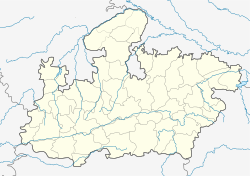Udaipur (Madhya Pradesh)
| Udaipur | |
|---|---|
| town | |
| Location in Madhya Pradesh, India | |
| Coordinates: 23°54′01″N 78°03′24″E / 23.900177°N 78.056655°ECoordinates: 23°54′01″N 78°03′24″E / 23.900177°N 78.056655°E | |
| Country |
|
| State | Madhya Pradesh |
| District | Vidisha |
| Languages | |
| • Official | Hindi |
| Time zone | IST (UTC+5:30) |
| PIN | 464221 |
| Telephone code | 91-7594 |
| Vehicle registration | MP-40 |
Udaipur is a town in the Indian state of Madhya Pradesh near Ganj Basoda. It is the site of a well-preserved Śiva temple, a monument of national importance protected by the Archaeological Survey of India.
Udaipur's history reaches back to at least the ninth century, but it became famous and appears to have assumed its present name under the Paramāra king Udayāditya (c. 1060-87).
Udaipur is located at 23°54'2"N 78°3'29"E.
Udaipur is connected by bus service from Ganj Basoda railway station 93 km from Bhopal Junction towards Jhansi (203 km) and 604 km from New Delhi Jn.
The monuments of Udaipur were first studied by M. B. Garde and published in the reports of the archaeological department of Gwalior state. The data in these reports was compiled into a list prepared in 1952.
The most important temple at Udaipur is that dedicated to Śiva and known today as the Nīlakaṇṭheśvara. It was built in the second half of the eleventh century and is the only surviving royal temple of the Paramāra kings. Architecturally, the temple spire belongs to a class known as bhūmija, or 'earth born,' a mode of temple building that originated in the Mālwa region.
The complex Śaiva iconography of the temple has been studied by Doria Tichit.
In the entrance porch of the temple are series of more than sixty votive records. Not yet studied in a systematic fashion, these form a continuous sequence from the time of the Paramāras – Devapāla (1218–39) is mentioned – through the period of the Tughluqs and beyond. For example, one inscription mentions a festival (yātrā) of the god Udaleśvara in 1338, the same year as the Tughluq inscription recording the construction of the mosque in the temple precinct.
Directly next to the temple is a small mosque constructed during the reign of Muhammad ibn Tughluq. A pair of inscriptions record the building of this structure in AH 737 and 739 AH (i.e. 1336-37 and 1338-39 CE).
...
Wikipedia

